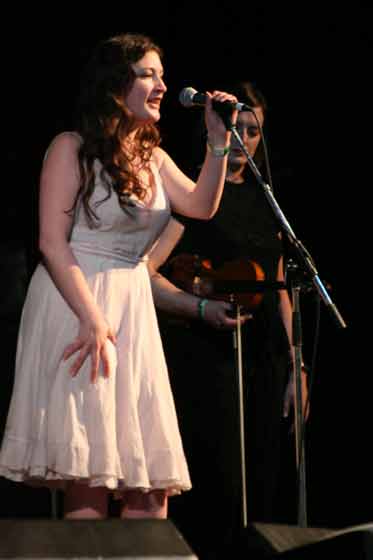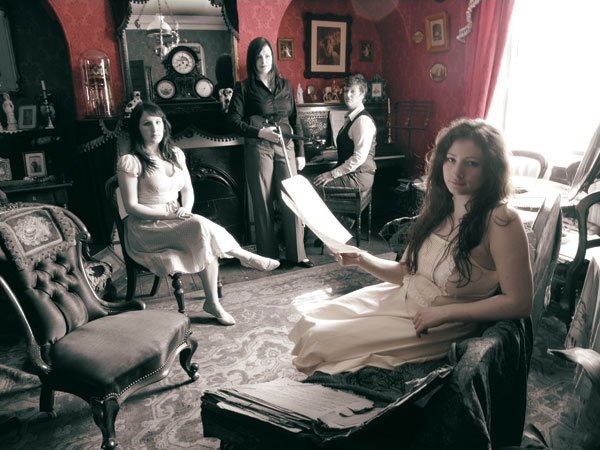Cut Out All That Jigging, You
By Christopher Hill
Rachel Unthank: Setting the bar higher, opening up new territory, showing the old tradition startlingly full of life, and issuing a bracing challenge to the current generation of British folk musicians
THE BAIRNS
Rachel Unthank And The Winterset
Real WorldBob Dylan once said something about how the only true death you can feel in music was in folk music. Particularly, I'd guess he was thinking about the body of song that came down off the southeastern American mountains, the Appalachian tradition that forms the core of American folk music. Where that death came from was the northern border counties of England and southern Scotland, a region that has some of the grimmest history of any place in Europe. It was the cockpit of the centuries-long, savage back and forth struggle between England and Scotland, regularly burned over by brutal scorched earth warfare and in between ravaged by institutionalized raiding between the Border clans. The peasants who had taken the brunt of this for generations took their first chance when the New World opened up, and fled to the American back country, bringing the strain of darkness and harsh fatalism to the mood of the Appalachian culture.
Now we're hearing from two sisters and their friends who haven't fled, but rather have dug deep into the darkness and occasional buried golden beauty of their culture, and ingeniously molded it into something new and challenging. .
Already hailed as the new voice of British folk in their native land (they won the BBC Horizon Award and Mojo magazine's prize for best folk album of the year) the Unthank sisters, Rachel and Becky, and their backup musicians, the Winterset, are a dash of icy Northumbrian water in the face of those whose last memories of British folk are Fairport Convention and Steeleye Span. The last generation's cavalcade of mumming, maypole dancing, neo-pagan, ale and acid-inspired folk-rockers stops here. You will find no jigs and reels on Rachel Unthank and the Winterset's newest album, The Bairns. There are no Child ballads, no Tam Lin, no fairies, no Samhain in the Unthank's Northumberland.. The '60s and '70s folk-rockers saw the native British tradition as the door to Merry pagan Olde England. The Unthank sisters would not be at home there. But there is vision here.
The Bairns is ambitious. At first listening, it's as simple as the purest of the purists could want The two sisters' voices so clear, so honest but so artful, bring the old traditions and archaic speech patterns startlingly alive. But in fact The Bairns, taken as a whole, is clearly a statement—a new kind of art-folk statement. While the Unthank's Geordie acents make it sound artless, the project is carefully assembled. The accompaniment (and that's what it is—accompaniment, not a backing band) is Belinda O'Hooley's icy piano and Niopha Keegan's violin. And this is very definitely a violin, mind you, not a fiddle, used for sonority, moody coloring and drama, not for dance tunes. The arrangements are more like dark minimalist chamber music or folk cabaret than the default folk settings—no uillean pipes, no tin whistle, no harp, no bodhran. And no percussion save for occasional tap of their wooden clogs. Nor is there any gesture at all towards rock or pop. And then there's their proud deployment of their Geordie dialect, notoriously one of Britain's most impenetrable. Their staunch refusal to appeal to Anglo-Celtic folk mystique is admirable in a way. But about halfway through The Bairns you wonder if the Unthanks haven't renounced too much. Most of the things that lure a listener into a record have been stripped out. The Unthank sisters are throwing down a challenge to themselves and to their audience. They want to see if they—and we—can do without variety of rhythm, melody, mood and instrumentation. Much the same thing could be said about Astral Weeks. And that of course raises the question of whether the Unthanks aren't fighting out of their division. But give them credit—they seem to be fully aware of the chances they're taking.
Clearly there are conceptual reasons for the choices they've made. There is structure here, and unity of purpose. There are themes—RUTW's music has the feel of a repertoire in the grip of obsessions—domestic violence, suicide, infant mortality, drowned sailors, alcohol, coerced military service, rain. Four songs about the sufferings of women, three songs about menfolk perished or otherwise missing at sea. The individual songs are part of a CD-length structure linked by five "Lull"s or lullaby fragments, the first of which, "Newcastle Lullaby" is reprised at the very end. And there's a unity of gender perspective. Where Sandy Denny and Maddy Prior skipped easily between male and female roles, these are all women's songs.
It's a structure that becomes downright complex-"Blue's Gaen Oot o' the Fashion" weaves sections of no less than five traditional songs into its seven stanzas, ironically conflating a song about brutal navy press gangs with jolly seaside Victoriana. Fairport fans will probably come closest to Anglo-Celtic high spirits in the "Up with smoky Shields/ And hey for bonny Newcastle" one-hand-waving-free chorus that ends the song. The fairy-tale treatment of press gang horrors as if they're singing about the wee folk ("They always come in the night, they never come in the day, they always come in the night, and steal the laddies away") is a slightly demented bit of whimsy, one of the few spots of humor on the album. The Unthanks bring this collage off with panache and find a groove that seamlessly weaves the pieces together. In microcosm it's what they're attempting with The Bairns as a whole.
Rachel Unthank (foreground) and Winterset (from left: Becky Unthank, Niopha Keegan and new member Stef Conner, who has replaced Belinda O'Hurley): A dash of icy Northumbrian water in the face of those whose last memories of British folk are Fairport Convention and Steeleye SpanThis bleakly eerie world contains a vision of beauty deep inside the darkness, moments of glowing lyricism that contrast with the prevailing gloom like veins of gold in dark stone. They've created this world from material solidly in their folk tradition, without ever having to step outside the "Trad. Arr." repertoire. Yet go beyond it they do, with a selection of covers that turn the mood in intriguing directions. These outliers are the three tunes with a kindlier or more lyric vision: "Blackbird," and "Fareweel Regality" and "Sea Song" by Robert Wyatt, famous eccentric and founder of the '60s art-rock aggregation The Soft Machine.
"Blackbird" starts out plain but pretty, then is transformed by the loveliest intertwining of the two voices rising together ecstatically on the knockout, pleading "Come back, come back" chorus. "Sea Song" is the one place where the sisters leave behind rural melancholy for the visionary realm, It's an atmospheric love song to a selkie, the shape-shifting seal people of northern Britsh folklore—or at least it's a metaphor for taking perilous delight in a lover's "madness." "Fareweel Regality"—a loving adieu in the tradition of songs like"The Parting Glass"—is open-hearted, firelit and generous, O'Hooley'chording reigned in and almost light-hearted, Keegan's violin for once almost dancing.
But ultimately, The Bairns suffers from a monotony of tone. Pianist O'Hooley stands guard over the songs like a stern music teacher, her theater of cruelty chords remorselessly enforcing a uniform mood. By the time you get to "Whitethorn" (written by O'Hooley), a song about a tree whose wood provides the material for a baby's cradle and coffin, the accumulated weight of bathos finally pulls The Bairns under by the bow.
Given RUTW's relatively short time in the public eye, it is brave of the Unthank sisters to attempt a major statement, which they surely have, perhaps a Pour Down Like Silver for its own era. The Bairns eventually staggers under the weight of its own proudly worn eccentricities. Nevertheless, the Unthanks have set the bar higher, opened up new territory, shown the old tradition startlingly full of life, and issued a bracing challenge to their generation of British folk musicians, for too long jigging haplessly away in their own little ghetto on the "Celtic/New Age" racks. From now on, British folk musicians must deal with the Unthank sisters, and in that way their ambitions have surely succeeded.
THE BLUEGRASS SPECIAL
Founder/Publisher/Editor: David McGee
Contributing Editors: Billy Altman, Derk Richardson
Logo Design: John Mendelsohn (www.johnmendelsohn.com)
Website Design: Kieran McGee (www.kieranmcgee.com)
Staff Photographers: Audrey Harrod (Louisville, KY; www.flickr.com/audreyharrod), Alicia Zappier (New York)
E-mail: thebluegrassspecial@gmail.com
Mailing Address: David McGee, 201 W. 85 St.—5B, New York, NY 10024
Founder/Publisher/Editor: David McGee
Contributing Editors: Billy Altman, Derk Richardson
Logo Design: John Mendelsohn (www.johnmendelsohn.com)
Website Design: Kieran McGee (www.kieranmcgee.com)
Staff Photographers: Audrey Harrod (Louisville, KY; www.flickr.com/audreyharrod), Alicia Zappier (New York)
E-mail: thebluegrassspecial@gmail.com
Mailing Address: David McGee, 201 W. 85 St.—5B, New York, NY 10024



